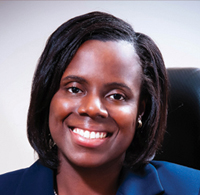Q&A with Pumtiwitt McCarthy
Tell us about your current position.
I completed my postdoctoral fellowship at the Center for Biologics Evaluation and Research at the Food and Drug Administration on the National Institutes of Health campus in Bethesda, Md., last July. The following August, I started as an assistant professor of chemistry at in Baltimore. I am teaching courses, establishing a research program and serving on university and department committees. My research program is focused on gaining a better understanding of enzymes that produce capsular polysaccharides in the pathogen Neisseria meningitis, one of the leading causes of bacterial meningitis.
 |
| McCarthy |
What are the key experiences and decisions you made that have helped you reach your current position?
I had great mentors as an undergraduate student, graduate student and postdoc. They were encouraging and supportive, which really helped me to gain more confidence in myself and my scientific ability. This confidence led me to seek out and go after opportunities that I otherwise would not have pursued. I also think developing my skills outside the lab, such as writing, serving on committees and giving presentations, has made me more well-rounded.
How did you first become interested in science?
I can remember being interested in the way things work even at a young age. I distinctly remember a time when I broke my parents' record player because I wanted to figure out how all its parts worked together. I really developed a love for science when I had the opportunity to do research as an undergraduate.
Were there times when you failed at something you felt was critical to your path? If so, how did you regroup and get back on track?
The transition from high school to college was particularly difficult for me, and I had to take a step back and reassess what was working for me and what wasn’t and make appropriate changes. This made me more determined not to be defined by my past failures but instead by what I have succeeded in. I think failures and disappointments are, of course, unwanted but necessary. It is through these disappointments that I can appreciate and be grateful for how far I have come.
What advice would you give to young persons from underrepresented backgrounds who want to pursue careers in science similar to yours?
I am honored and proud to be at Morgan State University, which is a historically black college or university, so that I can hopefully help make a difference in increasing the number of minorities entering science, technology, engineering and math fields. My advice is to seek out mentors who are in the position you want to be in and learn from them. I also would say work hard, never give up and always take the opportunity to learn from your mistakes.
What was the last book you read?
I am currently reading "At the Helm: Leading Your Laboratory" by Kathy Barker.
Do you have any heroes, heroines or role models? If so, describe how they have influenced you.
My mother is my heroine. She immigrated to America from Liberia in the late 1970s. She had a very good job back home but essentially had to start all over in America. She was hardworking, humble and respectful to everyone she encountered. She always told me, "To whom much is given, much is expected." I try to remember that I have been blessed and give my all to whatever I do.
What is it that keeps you working hard and studying science every day?
I would say my desire to be a lifelong learner. I want to always keep growing and continually improve. My ultimate wish is to instill a love and understanding of biochemistry in my students so that they see it as a field that is accessible to them and one they can pursue.
Enjoy reading ASBMB Today?
Become a member to receive the print edition four times a year and the digital edition monthly.
Learn moreGet the latest from ASBMB Today
Enter your email address, and we’ll send you a weekly email with recent articles, interviews and more.
Latest in People
People highlights or most popular articles

Cedeño–Rosario and Kaweesa win research award
The award honors outstanding early-career scientists studying cancer, infectious disease and basic science.

ASBMB names 2026 award winners
Check out their lectures at the annual meeting in March in the Washington, D.C., metro area.

Peer through a window to the future of science
Aaron Hoskins of the University of Wisconsin–Madison and Sandra Gabelli of Merck, co-chairs of the 2026 ASBMB annual meeting, to be held March 7–10, explain how this gathering will inspire new ideas and drive progress in molecular life sciences.

Castiglione and Ingolia win Keck Foundation grants
They will receive at least $1 million of funding to study the biological mechanisms that underly birds' longevity and sequence–function relationships of intrinsically disordered proteins.

How undergrad research catalyzes scientific careers
Undergraduate research doesn’t just teach lab skills, it transforms scientists. For Antonio Rivera and Julissa Cruz–Bautista, joining a lab became a turning point, fostering critical thinking, persistence and research identity.

Simcox and Gisriel receive mentoring award
They were honored for contributing their time, knowledge, energy and enthusiasm to mentoring postdocs in their labs.

